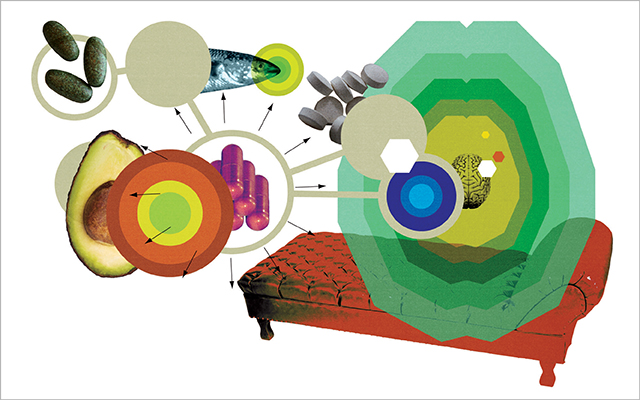Just as we should follow a daily regimen that keeps our hearts, skin, and other organs flourishing, we should also be mindful of nourishing our brains, even if we don’t suffer from mental illness. The following tips are designed to keep the jewel in our crowns healthy, and — since everything is connected — may well clear up other problems below the neck.
1. Eat More Healthy Fats
Good sources of omega-3 fatty acids are salmon, herring, sardines, and anchovies, as well as pasture-raised meats and eggs, flaxseeds, walnuts, and omega-3 fish-oil supplements, especially those containing eicosapentaenoic acid (EPA).
2. Get More Protein
A healthy brain depends on the steady creation of neurotransmitters. The basic building blocks for these transmitters are amino acids that come from the protein in our diets. Experts suggest that 20 to 25 percent of our diets should come from high-quality protein like meat, eggs, dairy, beans, and legumes. And it’s a good idea to begin the day with a solid helping of protein. “I tell people to have dinner for breakfast,” says naturopath Ray Pataracchia. “You might get sick of eggs every day, so you have to change it up and be inventive.”
3. Avoid Sugar Highs
The brain has an enormous need for glucose, and our blood supplies this essential fuel as it circulates through the brain. This supply needs to be slow and steady, without the peaks and valleys caused by simple sugars found in junk food. Stick to the complex carbohydrates found in vegetables, whole grains, and many fruits.
4. Buffer Stress With B and C Vitamins
Stress bombards even the most ordinary lives, both from the outside — a hectic schedule, an angry coworker, commuting to work in heavy traffic — and from the inside, such as when our bodies battle infection and illness. A steady stream of cortisol and other stress hormones can weaken neurotransmitters. Protect them with vitamins C and B — especially niacin, or B3 — which together can regulate and protect these neurotransmitters. The official minimum daily-requirement numbers, says natural-health educator Andrew Saul, PhD, are laughably low: “For someone with a reasonably good diet, a couple hundred milligrams of supplemental B3 would be wise.”
5. Stay Connected
Robert Hedaya, MD, at the National Center for Whole Psychiatry, compares human beings to neurons: The more connections one neuron has with other neurons, the more vibrant it is. When the connections are severed, a solitary neuron can shrivel and die. Similarly, humans need a connection with other humans and with nature to flourish.
6. Develop a Spiritual Practice
“Fear creates stress,” Hedaya says. “Whatever it is that you’re stressed about, your cognitive framework is going to treat things as more or less stressful. With a spiritual practice, you develop the perspective that there is meaning to life and that we’re not alone. I think the importance of this is highly underrated in the psychiatric field. If you feel as if everything in life is up to you, that’s a lot of pressure. When you add to that the way that so many people live in isolation, that’s a toxic recipe.”
This originally appeared in “Whole-Body Psychiatry: Nutrition for Mental Health” in the March 2014 issue of Experience Life.




This Post Has 0 Comments